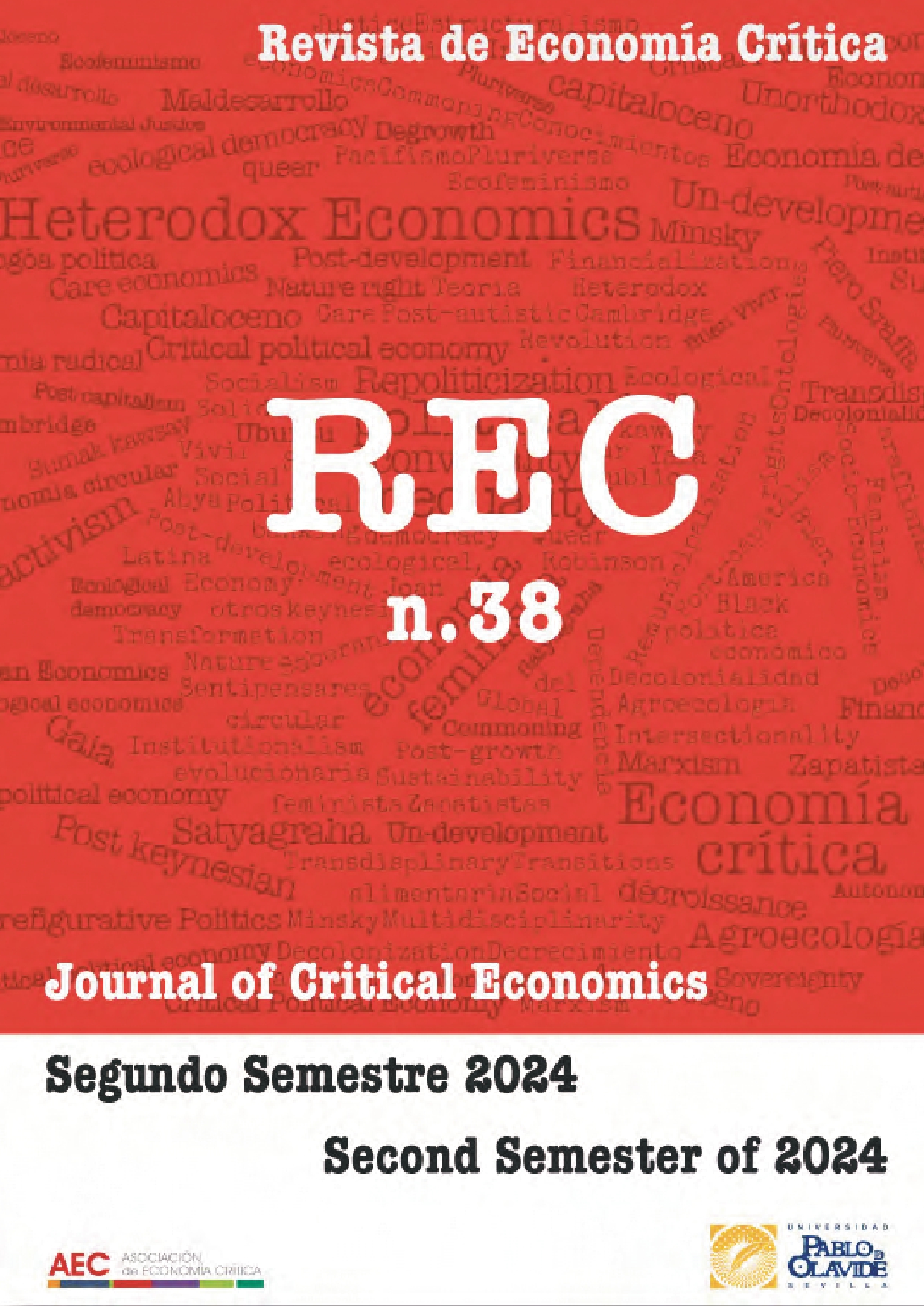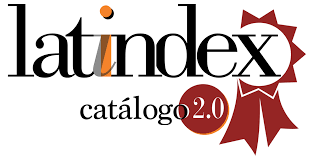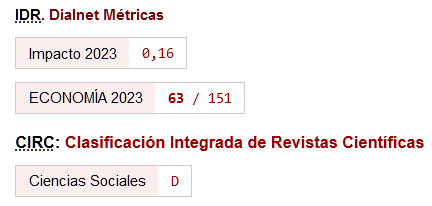Globalisation as a strategy of eco-social uprooting. A view from The Great Transformation
DOI:
https://doi.org/10.46661/rec.11370Keywords:
Great transformation, Financialization, Roots, Bureaucrazy, Fictitious commodities, CommonAbstract
The wide recognition of Polanyi's (1944) contributions to the study of globalisation in The Great Transformation has led us to review the timeliness of his proposal for the delegitimisation of the global market as a strategy of the powerful for the social uprooting of the economy. Our second objective will be to determine the role of internal nation-state bureaucracies in extending globalisation, applying the study to the cases of academic globalisation and global cities, which exemplify the conversion of labour and land into fictitious commodities. As a third aim, we explore through literature and communities of practice the convergent pathways of resistance to those proposed by Polanyi, driving germinal solutions or responses to the class segregation of globalisation.
We firmly uphold the validity of both Polanyi's methodologies and the primary conclusions he drew, despite the contemporary trajectory of the deregulated market that has led to financialization and uprooting scenarios beyond the scope of his original work. In this context, we shed light on the necessary complicity of national-local bureaucratic élites in the expansion of globalization, revealing the scope of their action mechanisms to bring collective goods and services of public utility into the market sphere. Additionally, we investigate the various forms of resistance against globalization, which, as potential solutions, demand a cultural and biophysical foundation for economic research to build upon. As practical solutions, we advocate for a return to the examination of the natural environment as a threatened essential habitat, while acknowledging alternative cultural practices for communal reorganization. These practices, found in both peripheral and central countries, currently offer participatory opportunities in response to the erosion of democratic processes.
Downloads
References
Alonso, Nuria y Ruiz, Mercedes (2023). Introducción al semi-monográfico "Brecha salarial de género". Revista Economía Crítica, 35, 38-42. https://www.revistaeconomiacritica.org/index.php/rec/article/view/689/591
Álvarez-Blanco, Palmar (coord.) (2023). Oikonomia y acción ciudadana. Transitando sistemas con la constelación de los comunes (2020-2023). Santander: La Vorágine.
Brand, Ulrich (2023). Crisis del modelo de vida imperial y transiciones ecosociales. Madrid: FUHEM ecosocial y los libros de la Catarata.
Cambrón, Ascensión (2015). Una reflexión sobre la universidad. A propósito de Ortega y Sacristán. AFDUC Anuario da Facultade de Dereito da Universidade da Coruña, 19, 471-482.
Carpintero, Oscar (2005). El metabolismo de la economía española: recursos naturales y huella ecológica (1955-2000). Lanzarote: Fundación César Manrique.
Chomsky, Noam (1999). Profit over people: neoliberalism and global order. New York; Toronto, ON, Canada; London: Seven Stories Press.
European Commission, Directorate-General for Employment, Social Affairs and Inclusion (2023). The future of social protection and of the welfare state in the EU, Publications Office of the European Union. https://data.europa.eu/doi/10.2767/35425
Eurostat. (2017). Final report of the expert group on quality of life indicators. Luxembourg: Publications Office of the European Union.
Fernández-Buey, Francisco (2009). Por una universidad democrática. Barcelona: El viejo topo.
Fisher-Kowalski, Marina (1998). Society’s metabolism: the intellectual history of materials flow analysis, part I, 1860-1970. Journal of Industrial Ecology, 2, 61-78. https://doi.org/10.1162/jiec.1998.2.1.61
FMI (1997). World Economic Outlook. Washington, D.C. : FMI.
Foley, Jonathan A.; DeFries, Ruth; Asner, Gregory P.; Barford, Carol; Bonan, Gordon; Carpenter, Stephen R.; Chapin, F. Stuart; Coe, Michael T.; Daily, Gretchen C.; Gibbs, Holly K.; Helkowski, Joseph H.; Holloway, Tracey; Howard, Erica A.; Kucharik, Christopher J.; Monfreda, Chad; Patz, Jonathan A.; Prentice, I. Colin; Ramankutty, Navin; y Snyder, Peter K. (2005). Global Consequences of Land Use. Science, 309 (5734), 570–574. https://doi.org/10.1126/science.1111772
Godelier, Maurice (2016). En el mundo de hoy, la antropología es más importante que nunca. Revista de Antropología Iberoamericana, 11(1), 59-77 https://doi.org/10.11156/aibr.110104
González de Molina, Manuel; Soto, David; Guzmán, Gloria; Infante, Juan; Aguilera, Eduardo; Vila, Jaime; García, Roberto (2019). Historia de la Agricultura española desde una perspectiva biofísica, 1900-2010. Madrid: Ministerio de Agricultura, Pesca y Alimentación.
Hall, Peter (1996). Ciudades del mañana. Historia del urbanismo en el siglo XX. Barcelona: Serbal.
Lapa, Javier (2017). Un análisis teórico sobre el proceso de financiarización económica Revista GEON, 4 (2), 125-145. https://doi.org/10.22579/23463910.30
Lefebvre, Henri (1970). La révolution urbaine. Paris : Gallimard.
Mazzucato, Mariana (2015). The Entrepreneurial State: Debunking Public vs. Private Sector Myths. London: Anthem Press.
McMichael, Philip (1997). Rethinking Globalization: The Agrarian Question Revisited. Review of International Political Economy, 4(4), 630–662. http://www.jstor.org/stable/4177246 https://doi.org/10.1080/09672299708565786
Marx, Karl (2017). El capital, libro I. Madrid: Siglo XXI.
Naredo, José M. (2003). La economía en evolución. Madrid: Siglo XXI.
Naredo, Jose M. (2006). Raíces económicas del deterioro ecológico y social. Más allá de los dogmas. Madrid: Siglo XXI.
Niskanen, William. A. (1971). Bureaucracy and Representative Government. Chicago: Aldine –Atherton.
Ortega y Gasset, José (1930). Misión de la Universidad. En: Obras Completas, IV (pp. 313–353), Madrid: Revista de Occidente.
Phelps, Richard (2022). Challenging the Academic Publisher Oligopoly. Raleigh :The James G. Martin Center for Academic Renewal. https://www.mindingthecampus.org/2022/11/18/ challenging-the-academic-publisher-oligopoly/
Polanyi, Karl (1944). The Great Transformation: economic and political origins of our time. New York : Rinehart.
Polanyi, Karl (1945). Universal capitalism or regional planning ? The London Quarterly of World Affairs, 10(3), 86-91
Polanyi, Karl (1947). Our Obsolete Market Mentality. Commentary, 3, 109-117.
Polanyi-Levitt, Kari (2013). From the great transformation to the great financialization. London: Zed Books Ltd.
Polanyi-Levitt, Kari (2014). Los conceptos más importantes en el trabajo de Karl Polanyi y su relevancia contemporánea. Economía y Desarrollo, 151 (1). 198-211
Ramos, Jesús A. (2015). El proyecto BEPS de la OCDE y el mito del fin de la planificación fiscal internacional: un enfoque crítico a propósito de los Final Reports 2015. Derecho & Sociedad, 45, 375-396. https://revistas.pucp.edu.pe/index.php/ derechoysociedad/ article/view/15255
Riechmann, Jorge (2017). Ecosocialismo descalzo en el siglo de la gran prueba. Viento sur, 150, 49-58
Santamarina, Beatriz (2006). Ecología y poder. El discurso medioambiental como mercancía. Madrid: Los Libros de la Catarata.
Downloads
Published
How to Cite
Issue
Section
License
Copyright (c) 2024 Joaquín Romano Velasco, María de las Mercedes Molpeceres Abella

This work is licensed under a Creative Commons Attribution 4.0 International License.
This licence allows third parties to share (copy and redistribute the material in any medium or format) and adapt (remix, transform and create from the material for any purpose, including commercial purposes), provided that authorship and first publication in this journal (The Journal, DOI of the work) is acknowledged, a link to the licence is provided, and it is stated whether changes have been made to the work.







